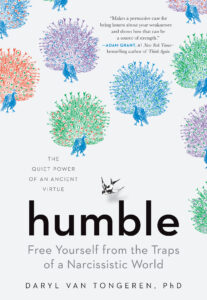
Why Being Humble is Actually in Our Self-Interest
Daryl Van Tongeren on a “Liberating, Empowering, and Revolutionary” Approach to Living
Pride comes before the fall.
This ancient warning has spanned cultures and time, has been described in Greek myths and proclaimed in religious teachings. Consider the story of Narcissus, who was so enamored with his own reflection that he ignored amorous pursuers and eventually longed for death, revealing the dangers of self-absorption.
The myth of Arachne cautions the perils of overconfidence and the unwillingness to listen to and learn from others, lest you be like a weaver turned into a spider, spending your days endlessly spinning webs in vain. Religions—from Buddhism to Christianity to Islam—warn their adherents to avoid the hazards of hubris. The arrogant, cocky, and self-assured are destined to be knocked down, put in their place, or downright humiliated. Think too highly of yourself and you’re going to be smitten by an angry god or some force of cosmic justice (or turned into an arachnid).
In modern culture, two lines of thought have developed about what humility is. First, we began to equate humility with humiliation. We were taught that those who brag get their eventual comeuppance through public shame or embarrassment. This can give way to self-deprecation and hiding our accomplishments, leaving us balancing a desire for ambition with the fear of standing out.
Although they have the same root word, humility and humiliation are quite different. Humiliation is about embarrassment, shame, or subjugation. Humility comes from within and cannot be forced by another person or external situation. Research has found that people respond negatively to humiliation but positively to humility. When humility is equated with humiliation, it becomes a punishment, like a bar of soap for the vulgarity of boasting, and its taste starts to sour.
Alternatively, those who have long abandoned any notion of gods or karmic justice think of humility as an antiquated idea with no real bearing on modern life. If anything, humility has been used as a tool of oppression to keep some people down while others stay in power. Far too many people have been wrongly told to stay in line or be quiet in the name of “humility.” Modern culture asserts that strength comes from power, aggression, and dominance. “Nice guys finish last,” after all, so those who adhere to anachronistic notions of modesty aren’t going to get anywhere in life. It’s better to be brash, bold, and confident, even if you “fake it till you make it.”
As we can see, humility has often been misunderstood or exploited. But true humility is neither humiliation nor oppression. It’s not an attribute of the weak or a penalty for pride. It’s not a tool of the oppressor. In fact, modern science has revealed that true, authentic humility is a secure openness to the world, where we can be honest with ourselves and others about our strengths and limitations, seeking to learn new perspectives and caring deeply about those around us. It is not shame or guilt, nor is it an excuse to be a doormat.
Humility is a way of approaching ourselves, other people, and the world around us with a sense of enoughness—an unconditional worth and value—that opens us to the world as it is. And two decades of scientific research agree: Humility helps strengthen relationships, enhance work, and improve society. It is powerful and transformative and wildly countercultural. And it might be exactly what we all need.
*
I became interested in humility in graduate school. I was part of a positive psychology research group that sought to identify factors that contributed to human flourishing. Most of our work centered on forgiveness, but while I was there, we started branching out into character strengths and their role in relationships. I was studying meaning in life and forgiveness, and my dissertation looked at how we maintain meaningful relationships by offering forgiveness to our romantic partners.
My good friend and fellow graduate student colleague Don Davis conducted his dissertation on how humility plays a role in relationships. Slowly, a synergy built around humility. Along with another fellow graduate student, Josh Hook, the three of us sought to advance research in this area that psychology had largely ignored.
A selfish life of narcissistic indulgence is hollow and unfulfilling. This approach leaves a wake of relational carnage and intrapersonal turmoil.
At the time, there were two reasons why psychological research hadn’t yet explored humility. One stumbling block was that researchers thought measuring humility would be a logistical nightmare. After all, isn’t it absurd to ask people how humble they are? Would a truly humble person be honest and report high humility? Or would they think of all the people who are humbler and report more modest levels? And wouldn’t a raging narcissist max out on self-reported humility? Researchers feared self-reported humility would be diabolically unreliable.
Fortunately, they figured out ways to address these problems, and it didn’t turn out to be as difficult as they once imagined. In fact, numerous scholars have joined in the empirical investigation of humility, turning it into a thriving area of scholarly inquiry.
But there was a second and, in my mind, larger stumbling block: Humility is a tough sell. On the surface, many Westernized, individualistic cultures don’t reward humility. The “squeaky wheel gets the grease,” and often the loudest, brashest, and most selfish people grab the power, resources, and money and appear to reap all the benefits and none of the costs. We elevate vanity and praise peacocking; we see narcissistic displays as the cost of doing business. In fact, we have come to idolize such actions as some misplaced form of confidence.
But any such gains are both superficial and short-lived. A selfish life of narcissistic indulgence is hollow and unfulfilling. This approach leaves a wake of relational carnage and intrapersonal turmoil. Put simply, our psychological and relational motivations for connection and meaning don’t align with being a self-centered narcissist. And in the past decade, we finally have the psychological research to support such a claim. We know what the ancient philosophers and poets have proclaimed: Humility is a strength worth cultivating. Despite current cultural myths, arrogant conceit is a trap that will consume our time and attention and leave us disconnected and disillusioned. Humility, on the other hand, is liberating, empowering, and revolutionary.
So, when asking whether or not “pride comes before the fall,” consider this: According to the folks at Merriam-Webster, ancient uses of the word pride connote an “inordinate self-esteem” and “unreasonable conceit of superiority.” It was included in the list of the seven deadly sins. Over time its meaning has shifted to also include self-respect or collective self-worth. The former view of pride is poisonous and more akin to narcissistic arrogance; the latter view is rather healthy. Yet the opposite of humility is not pride; in fact, humility requires a healthy sense of self that springs from security.
Rather, humility’s foe is arrogance or conceit; a superior view of oneself in which others are viewed as inferior and entitlement reigns supreme. And this creeps into myriad expressions in daily life, is consistently reinforced by culture, is modeled in the highest forms of entertainment and politics—and it is ultimately unfulfilling. Indeed, arrogance comes before the fall. But humility can grant us a life rich with meaning, healthy relationships, and secure wholeness. Culture may tell us to embrace selfishness and conceit as a pathway to make the most of life, but the scientific research tells a different story.
*
In the 1970s and ’80s, psychologists (and overwhelmingly, social psychologists) began studying self-esteem. Research took off exponentially, and by the ’90s, social policies were being based on a flurry of research findings that purported self-esteem was the great panacea to a host of social ills. The problem is that these interventions didn’t work. People were just as lonely, underachieving, aggressive, and miserable as ever. In fact, some have argued that this focus on self-esteem actually made things worse.
Jean Twenge, one of the foremost experts on narcissism, led a meta-analytic review of all results on the Narcissistic Personality Inventory (which gauges one’s inflated sense of self; typical respondents are college students in the United States) from 1982 to 2009 and found significant increases over time.
That is, American college students reported an increasingly overinflated sense of self, perhaps in part because of the focus on self-esteem during the 1980s and ’90s. Because of this analysis, she and Keith Campbell (another narcissism expert) argue that the United States is in the midst of a narcissism epidemic, though other work has found that Westernized, individualistic countries (such as the United Kingdom) around the world also tend to be more narcissistic than Eastern countries. Despite some criticisms of this work, the data remain clear: People report being more self-involved now than in generations before.
Humility changes lives. It is a boon for healthy relationships, a necessary component for the workplace, and an important part of any society that seeks to grow and change.
What is the result of this uptick in self-aggrandizement? Research suggests parallel drops in empathy and concern for other people and increases in ideological endorsement of tolerance and equality. People are now more focused on themselves and less willing to take the perspective of someone else, even though they ideologically agree with the concept of tolerance and equality. To be sure, decades of focusing on inflating the self appears to have backfired. It didn’t solve societal woes or personal insecurities. Instead, the result is that many of us feel disconnected, anxious, and conflicted. Relationships have soured, conflict is persistent, and rifts feel deeper and more unbridgeable than ever. It’s time for something different.
*
Despite the cultural fascination with narcissistic self-aggrandizement, I refuse to accept that this is healthy or beneficial. I can’t imagine a society is healthy or flourishing when so many of its citizens are disconnected and unhappy. And we can’t be the first generation to try to solve enduring problems of isolation or meaninglessness. These are ancient topics of deep human concern, about which we’ve amassed a bit of wisdom.
Humility can change our life and society at large for the better. Many great thinkers have bragged about the power of humility. Socrates is credited with saying, “Pride divides the men, humility joins them.” Saint Augustine, a Christian theologian in the fourth century, argued, “It was pride that changed angels into devils; it is humility that makes men as angels.” Mother Teresa wisely asserted, “If you are humble, nothing will touch you, neither praise nor disgrace, because you know what you are.” Albert Einstein remarked, “A true genius admits that he/she knows nothing.” Mary Oliver wrote, “Humility is the prize of the leaf-world. Vain-glory is the bane of us, the humans.” These represent a fraction of the many people who have glimpsed the value of humility and have exhorted others to practice it.
We are now at a place where modern science has confirmed ancient wisdom: Humility is powerfully transformative. Research in humility has accelerated in the last decade, and the time is ripe for psychological science to speak to the powerful role of humility in private and public life. Scientific interest and effort have increased, and the data are clear and compelling: Humility changes lives. It is a boon for healthy relationships, a necessary component for the workplace, and an important part of any society that seeks to grow and change.
Lest we begin thinking of humility as a cure-all, let’s pause and hold our collective excitement (and egos) in check. Just as efforts designed to boost self-esteem indiscriminately didn’t work, humility won’t solve all of life’s problems. Let’s take a humble approach to the research on humility, understanding that it’s both new and promising while full of nuance and in need of context. Some people are humble in some areas of life (such as with family) but not others (such as at work). And the same people can be humble one day and jerks the next. Some have tried to exploit or subjugate others, inexplicably in the name of humility. People may call something humility that is anything but humble. But true, authentic humility can be liberating. It is transformative and revolutionary—and it’s worth cultivating in our own life.
__________________________________

Excerpt from Humble: Free Yourself from the Traps of a Narcissistic World © Daryl Van Tongeren, 2022. Reprinted by permission of the publisher, The Experiment. Available everywhere books are sold. experimentpublishing.com
Daryl R. Van Tongeren
Daryl R. Van Tongeren, PhD, is an associate professor of psychology at Hope College. As a social psychologist, he has published over 160 scholarly articles, coauthored The Courage to Suffer (Templeton Press, 2020), and currently serves as associate editor for The Journal of Positive Psychology. His research has been covered by The New York Times, Washington Post, and NPR affiliate radio stations.



















